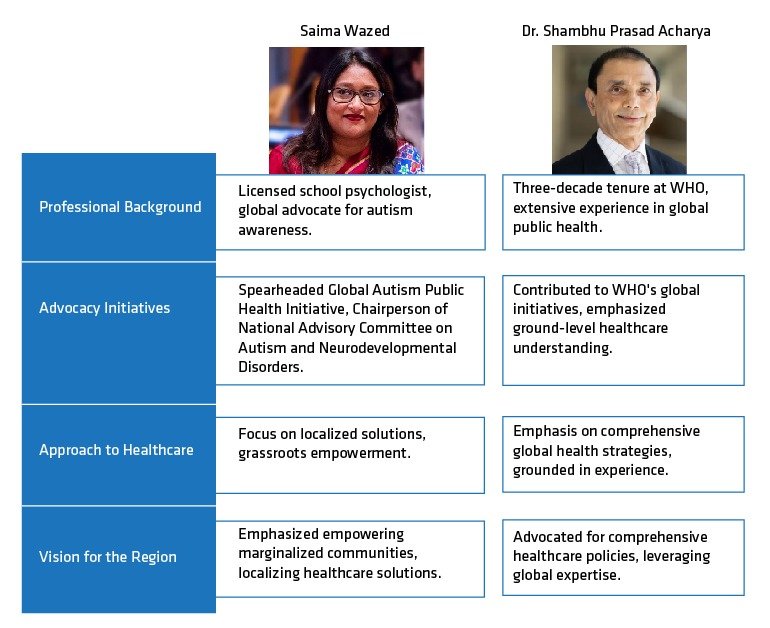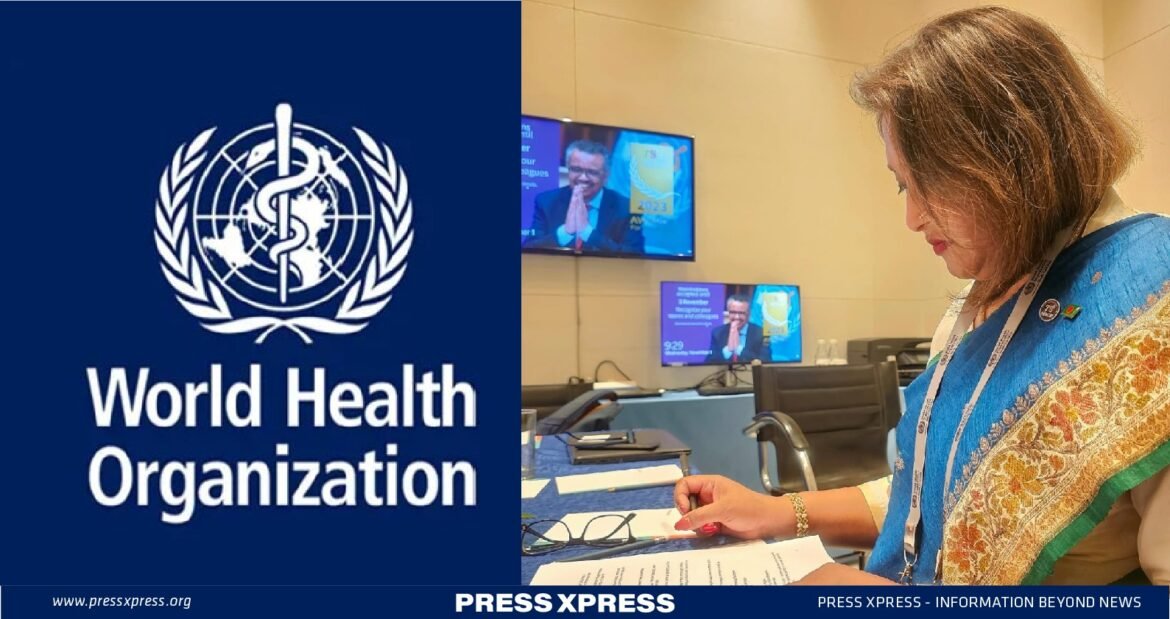Saima Wazed, daughter of Prime Minister Sheikh Hasina, won a historic election to serve as the Regional Director for Southeast Asia for the World Health Organization (WHO). Saima pipped Nepal’s Shambhu Prasad Acharya by garnering eight votes while Acharya, a top WHO official, secured only two votes.
Saima will begin office as Regional Director on February 1, 2024, for a five-year term, with the possibility of reappointment once.
This victory is significant not only for Saima but also for Bangladesh, as she becomes the first Bangladeshi to assume this key position since the WHO’s founding in 1948. Her accomplishments, vision, and the circumstances surrounding her victory portray a complex picture of the complexities of health diplomacy and the difficulties facing Southeast Asia.
“Member states voted to nominate Saima Wazed during a closed meeting at the seventy-sixth session of the WHO Regional Committee for South-East Asia Region,” said a WHO news release.
The election, which took place in New Delhi, saw the participation of eleven countries, including Bangladesh and Nepal, India, Bhutan, North Korea, Indonesia, Maldives, Myanmar, Nepal, Sri Lanka, Thailand, and Timor-Leste to elect the next regional director. On August 18, members of the WHO received a list of candidates from Director-General Dr. Tedros Adhanom Ghebreyesus.
Saima Wazed, the granddaughter of Father of the Nation Bangabandhu Sheikh Mujibur Rahman, has attained global acclaim for her unwavering endeavors in promoting awareness and providing assistance for autism and other Neurodevelopmental Disorders. She will begin office as Regional Director on February 1, 2024, for a five-year term, with the possibility of reappointment once.
You can also read: Saima Wazed announces candidacy for Director of WHO South-East Asia Regional Office
Ready to build “A healthier South-East Asia”: Saima Wazed
Following her resounding victory as the new WHO Southeast Asia Regional Director, Saima Wazed said she looked forward to “building a healthier South-East Asia”. She expressed her heartfelt gratitude and determination on X (formerly Twitter), stating, “Thank you to @WHOSEARO Member States for choosing me to be their next Regional Director! I would like to pay tribute to our outgoing RD, Dr Poonam Khetrapal Singh, for her decade of service to the public health of our region. A special tribute as well for my fellow nominee in this race, Dr Acharya. In his long and distinguished career, he has been an invaluable asset to WHO – and I hope our region will continue to benefit from his knowledge and experience.”
Her profound expression reflected not only her sense of honor and responsibility, but also her unwavering commitment to driving transformative change in the domain of public health. With these comments, she set the stage for her future leadership, emphasizing her willingness to face the upcoming challenges and tirelessly work towards a more equitable and resilient healthcare system in Southeast Asia.
An empowering manifesto for change and it’s implications
In her election manifesto, Saima emphasized three important visions. First, she intends to strengthen the ability of member states and the WHO to address healthcare disparities by focusing on current challenges and unanticipated barriers. Second, she aims to empower marginalized groups in order to prevent their further marginalization. Lastly, she intends to facilitate the implementation of equitable healthcare solutions by promoting innovative, community-specific local approaches. Saima advocates for a bottom-up strategy that recognizes and utilizes the expertise of member states in comprehending their own communities, emphasizing the value of locally tailored solutions over one-size-fits-all policies.
The Southeast Asia region, home to more than 2 billion people, is grappling with numerous health challenges, ranging from communicable and non-communicable diseases to maternal and child health issues. Saima’s appointment comes at a critical juncture, with the region confronting complex health crises exacerbated by the ongoing COVID-19 pandemic. Her victory reflects the growing recognition of mental health’s significance and the need for individualized, inclusive healthcare solutions that take into account the region’s diverse realities.
Candidates comparison
Two candidates with complementary skills and experiences emerged as frontrunners in the recent election for the position of World Health Organization (WHO) Southeast Asia Regional Director: Saima Wazed and Dr. Shambhu Prasad Acharya.

The dynamic contrast between Saima’s advocacy-driven strategy and Acharya’s extensive experience within the WHO outlined the crucial decision member states confronted during the election. Saima’s track record of advocating for inclusive healthcare solutions, combined with her vision for customized, community-centered approaches, positioned her as the transformative leader capable of addressing the region’s urgent healthcare challenges.


